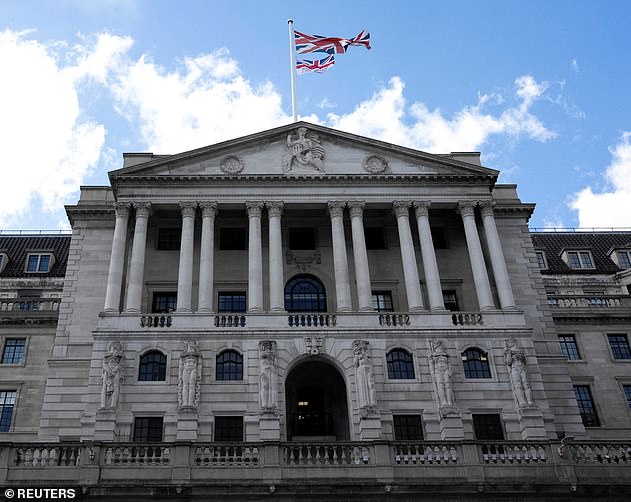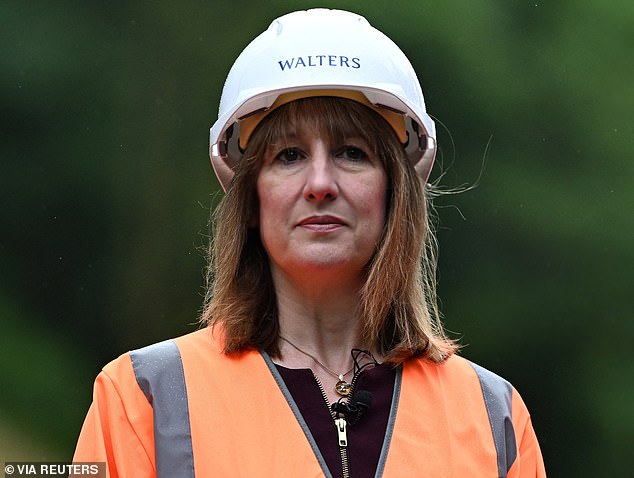The Bank of England cut interest rates to 4 per cent today – but warned Rachel Reeves‘ tax raid on businesses has pushed up food prices for British households.
For the first time in the Bank’s history, policymakers had to vote twice on how fast to slash borrowing costs amid a three–way deadlock.
In a boost to mortgage–holders, Threadneedle Street economists cut rates by 0.25 percentage points to 4 per cent after an unprecedented second vote.
But inflation is forecast to hit 4 per cent later this year – higher than the Bank’s previous expectations and its 2 per cent target – casting doubt on the pace of future interest rate reductions.
Andrew Bailey, the Bank’s governor, cautioned that subsequent rate cuts must be done ‘gradually and carefully’.
The warning came as the Bank’s Monetary Policy Committee (MPC) said rising prices are being driven in part by the Chancellor’s hike to employers’ National Insurance contributions (NICs) and her inflation–busting minimum wage increase.
Prior to the announcement, experts had reckoned a slowdown in the jobs market and stagnant economic growth would prompt the MPC to slash rates on Thursday.
Data from the Office for National Statistics (ONS) showed the rate of UK unemployment increased to 4.7 per cent in the three months to May – the highest level for four years.
And average earnings growth, excluding bonuses, slowed to 5 per cent in the period to May to its lowest level for almost three years.
ONS also data showed the UK economy contracted in both April and May.

The Bank of England cut interest rates to 4 per cent today – but warned Rachel Reeves’ tax raid on businesses has pushed up food prices for British households

The Monetary Policy Committee said rising prices are being driven in part by the Chancellor’s hike to employers’ National Insurance and inflation–busting minimum wage increase
In an attack on Ms Reeves, Tory shadow chancellor Sir Mel Stride said the rates cut had been required to ‘support the weak economy she has created’.
‘Inflation has almost doubled on her watch and unemployment is rising,’ he added.
‘Interest rates should be falling faster, but Labour’s jobs tax and reckless borrowing have pushed inflation well above target.’
But the Chancellor – who is thought to be facing a £50billion black hole in the public finances – defended her stewardship of the economy.
She said: ‘This fifth interest rate cut since the election is welcome news, helping bring down the cost of mortgages and loans for families and businesses.
‘The stability we have brought to the public finances through our Plan for Change has helped make this possible and helped us become the fastest growing economy in the G7 in the first quarter of this year.
‘We’re locking in this growth in the long run by investing over £113 billion in infrastructure, securing three major trade deals and embracing the technologies of the future – to drive up wages and improve living standards across the UK.’
Ms Reeves’ policies are judged to have fuelled spiralling grocery bills, with food inflation expected to peak at 5.5 per cent this year after hitting 4.5 per cent in June.
Stubborn inflation increased uncertainty over the pace of future interest rate cuts after the Bank’s nine–person MPC was trapped in a three–way split on today’s decision.
Four members, including Mr Bailey, voted to cut borrowing costs by 0.25 percentage points to 4 per cent, while three wanted to hold rates at 4.25 per cent.
Just one member, Alan Taylor, voted to cut rates faster, by 0.5 percentage points to 3.75 per cent.
For the historic second poll, Mr Taylor backed a 0.25 percentage point cut to break the deadlock.
That meant the final decision was a 5–4 split in favour of setting rates at 4 per cent.
Mr Bailey said: ‘We’ve cut interest rates today but it was a finely–balanced decision.
‘Interest rates are still on a downward path but any future rate cuts will need to be made gradually and carefully.’
The pound strengthened after the interest rates decision, with sterling up 0.6 per cent at 1.343 US dollars and 0.5 per cent higher at 1.152 euros.
But declines worsened on the London market, with the FTSE 100 Index down 0.8 per cent, or 76.2 points, to 9088.2, following the noon announcement.
The Bank’s Monetary Policy report, which was published alongside the rates decision, said that ‘domestic labour costs are currently an important driver of food price inflation’.
‘That is in part because a relatively high proportion of staff in these sectors are paid at or close to the National Living wage, which increased by 6.7 per cent in April,’ it added.
‘Furthermore, overall labour costs of supermarkets are likely to have been disproportionally affected by the lower threshold at which employers start paying NICs in part because a relatively high proportion of supermarket staff is employed part time.’
Higher employment costs have added 1 to 2 per cent to food prices so far, and a new packaging tax later this year is expected to pile further pressure on supermarkets.
Some products including coffee, chocolate and beef have also increased in price due to weather conditions.
Shoppers have already tried to reduce their supermarket spending by buying own–brand products, cheaper cuts of meat and larger value packs, the report said.
And grocers reported strong sales of ‘premium ready meals’ as Britons held back on eating out at restaurants in a bid to save money.
As well as hiking prices, businesses were trying to save money by cutting staffing levels including making redundancies and imposing hiring freezes, the report found.
And they warned that Deputy Prime Minister Angela Rayner’s workers’ rights bill was adding to their uncertainty.
‘To reduce the need for higher prices, many firms along the supply chain were trying to mitigate cost increases, including through reductions in headcount,’ the report said.
Bosses were looking towards automation, artificial intelligence and offshoring jobs as a solution to higher UK employment costs.
Liberal Democrat MP Daisy Cooper, the party’s Treasury spokesperson, said: ‘This could be welcome news for households who have been hammered by sky-high mortgage rates, but let’s not fool ourselves – this would have happened months ago if the Government was not acting as a roadblock to growth.
‘The mess the Conservatives left cannot be overstated, but Labour is failing to clean it up with their growth-crushing jobs tax and refusal to cut the reams of red tape holding back our exporters.
‘Countless people will still be worried about keeping a roof over their head and putting food on the table until the Government get serious about growth, and is more ambitious on the cost of living crisis by taking on our proposals to cut energy bills in half.’












